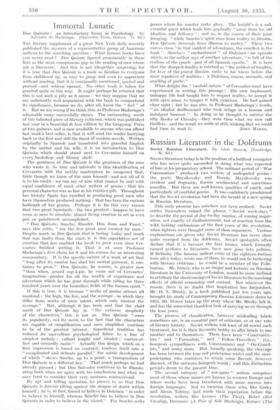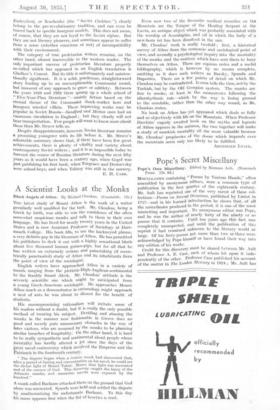Russian Literature in the Doldrums
SOVIET literature today is in the position of a brilliant youngster who has never quite succeeded in doing what was expected of him at his preparatory school. The militant period' of "War Communism " produced two writers of undisputed genius the poets Mayakovsky and Esenin. Mayakovsky was strident and dogmatic, Esenin sentimental and sometimes maudlin. But these are well-known qualities of youth, and particularly of youthful genius.' It was confidently proclaimed that the Soviet revolution had been the herald of a new spring in Russian literature.
This early promise has somehow not been realised. Soviet
critics themselves coined the phrase " Soviet week-days " to describe the period of day-to-day routine, of waning inspir- ation, not exactly of disillusionment, but of reaction from the wild, holiday enthusiasm of the first years of the revolution, when fighters were thought more of than organisers. Various explanations are given why Soviet literature has never since quite emerged from the doldrums. Soviet apologists often declare that it is because the best brains, which formerly turned perforce to literature, have now gone, into politics. If Bclinsky, (the famous radical critic of the eighteen-forties) were alive today, wrote one of them, he would not be bothering with, literary criticism ;
he would be a member of the Polit-
bureau. Mr. Struve, who is an émigré and lectures on Russian literature in the University of London, would be more inclined to attribute the snortcomings of Soviet literature to the numbing effects of official censorship and control. But whatever the reason, there is no doubt that inspiration has languished. Mr. D. S. Mirsky, in a book published just ten years ago, brought his study of Contemporary Russian Literature down to 1024. Mr. Struve takes up the story where Mr. Mirskv left it, and has the somewhat thankless task of carrying us on through the' lean years.
The process of classification, however misleading labels
Sometimes are, is an essential part of criticism, or at any rate 'of literary history. Soviet writers will least of all resent such treatment, for it is their favourite hobby to 'affix labels to one another and to themselves. There have been " Construe-UV- ists " and " FOrinaliitS " and " Fellow-Travelleis ," (ix., bourgeois sympathisers with Communism) and ",On-Gilaill- ists," and many More.' BUt, broadly speaking, the cleavage has been between the true-red proletarian writer and the near- proletarian who • contrives to retain some flavour, however discreet, of the outworn bourgeois world; and this distiactiOn persists down to the present time.
The second category of " not-quite " writers comprises most of those whose names are known in western Europe and -whose works have been translated with some success into foreign languages. Not to mention those who; like Gorky and Alexis Tolstoy, had made their reputation before the revolution, writers like Leonov - (The Thief), Bebel (Red Cavalry), Romanov Pair of Silk Stockings), Kataev (The Embezzlers), or Zoschenko (the " Soviet Chekhov ") clearly belong to the pre-revolutionary. tradition, and can even be traced back to specific bourgeois models. This does not mean, of course, that they are not loyal to the Soviet regime. But they arc not literary pioneers, and sometimes appear to suffer from a sense (whether conscious or not) of incompatibility with their environment.
The category of true proletarian writers remains, on the other hand, almost inaccessible to the western reader. The only important success of proletarian literature properly so-called which has appeared in an English translation is Gladkov's Cement. But its title is unfortunately and uninten- tionally significant. It is a solid, ponderous, straightforward story leading up to an unexceptionable Communist moral, but innocent of any approach to grace or subtlety. Between the years 1928 and 1982 there sprang up a whole school of ," Five-Year-Plan literature "—mainly fiction based on the eternal theme of the Communist shock-worker hero and bourgeois wreckei villain. These improving works may be popular in Soviet Russia—Sandford and Merton once had an enormous circulation in England ; but they clearly will not bear transportation. Few people will want to know more about them than Mr. Struve tells us.
DeSpite disappointments, however, Soviet literature remains a promising youngster with its life before it. Mr. Struve's; admirable summary shows that, if there have been few great achievements, there is plenty of vitality and variety about contemporary Soviet writers ; and it is as impossible today to forecast the course of Russian literature during the next fifty years as it would have been a century ago, when Gogol was just publishing his first book, when Turgenev and Dostoevsky were school-boys, and when Tolstoy was still in the nursery.
E. H. CAM



































 Previous page
Previous page